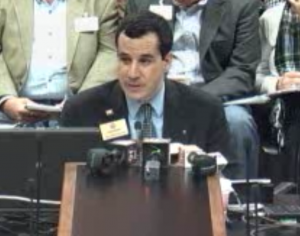 When I wrote the previous post, I assumed it would be obvious satire, not unlike the satirical guest post about the state quarter from a few months ago. Unfortunately, I grossly underestimated the effect that changing from coinage to immigration would have on the entire piece. In short, I completely forgot about Poe’s Law.
When I wrote the previous post, I assumed it would be obvious satire, not unlike the satirical guest post about the state quarter from a few months ago. Unfortunately, I grossly underestimated the effect that changing from coinage to immigration would have on the entire piece. In short, I completely forgot about Poe’s Law.
As originally formulated in 2005, Poe’s Law states:
Without a winking smiley or other blatant display of humor, it is [utterly] impossible to parody a Creationist in such a way that someone won’t mistake [it] for the genuine article.
In the years since, Poe’s statement has been more broadly interpreted to mean that, without a clear indication of the author’s intent, it is difficult or impossible to tell the difference between sincere extremism and the satirical parody of extremism.
Which brings us back to the Cinco de Mayo post. I assumed it would be so obviously over-the-top that I didn’t need a disclaimer as a lead in. Unlike feelings about the state quarter, however, opinions about illegal immigration, especially in Arkansas in 2011, bleed into sincere extremism. Without some indication that I was poking fun — the “Satire” tag at the bottom wasn’t visible enough — there was simply no way to make quality satire here that would be instantly visible as such.
So that’s my bad.
At the same time, think about what we’re saying here: the anti-immigrant views espoused by Jon Hubbard and the generally extreme positions held by the rest of the people name in the post made it possible that the ridiculousness I wrote was possibly not fake. What does it say about a group of lawmakers when you can read
“If it’s not Spanish, it’s Ebonics. If it’s not Cinco de Mayo, it’s Kwaanzakuh or whatever they call it.”
and think that it might be outlandish and offensive, but it’s not outside the realm of possibility?
Rep. Hubbard’s anti-immigrant stance is well documented, as is Rep. Mauch’s tie to a pro-secession, somewhat-racist group. That explains, at least in part, why the stuff written about them was believable.
If I were one of the other lawmakers mentioned in that post, however, I might want to question what it was about me and my positions that kept the post from being obviously satire with respect to me.